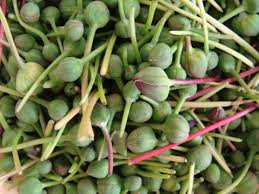
记忆方法
caper:cap头,per蹦。摇头晃脑的蹦表示开心——雀跃,欢蹦。
2. 谐音“开蹦”。
2. 谐音“开蹦”。
中文词源
caper 跳跃
来自拉丁词caper, 山羊。词源同cab, cabriolet.
英语词源
- caper
-
caper: Caper ‘jump about’ [16] and the edible caper [15] are two different words. The former is a shortening of capriole ‘leap’, now obsolete except as a technical term in horsemanship, which comes via early French capriole from Italian capriola, a derivative of the verb capriolare ‘leap’, which in turn was formed from capriolo ‘roebuck’; its ultimate source was Latin capreolus, a diminutive form of caper ‘goat’ (whence the English astrological term Capricorn, literally ‘goat’s horn’). (The French by-form cabrioler was the source of English cab.) Caper ‘edible bud’ came via French câpres and Latin capparis from Greek kápparis; the earliest English form was capres, but this came to be misinterpreted as a plural, and the -s was dropped from the singular in the 16th century.
=> cab, capricorn, capriole - caper (v.)
- 1580s, apparently short for obsolete capriole "to leap, skip," probably from Italian capriolare "jump in the air" (see cab). Related: Capered; capering.
- caper (n.1)
- type of prickly Mediterranean bush, also in reference to the plant's edible buds, late 14c., from Latin capparis (source of Italian cappero, French câpre, German Kaper), from Greek kapparis "the caper plant or its fruit," which is of uncertain origin. Arabic kabbar, Persian kabar are from Greek. Perhaps reborrowed into English 16c. The final -s was mistaken for a plural inflection in English and dropped.
- caper (n.2)
- by 1590s, "playful leap or jump," from caper (v.); meaning "prank" is from 1840; that of "crime" is from 1926. To cut capers "dance in a frolicsome way" is from c. 1600.
权威例句
- 1. She served six months in prison for the helicopter caper.
- 她因为直升机一案坐了6个月牢。
- 2. A call to the police should put an end to their little caper.
- 给警察打个电话应该就能制止他们的胡闹。
- 3. I'd like to know what caper he is up to now.
- 我倒想知道他现在又在玩什么鬼把戏了.
- 4. The children cut a caper in the yard.
- 孩子们在院子里兴高采烈地乱蹦乱跳.
- 5. What a mess we were in at the end of this caper — hair, eyes, cheeks and neck covered in treacle.
- 胡闹了一通后,我们浑身脏得一塌糊涂——头发、眼睛、脸颊、脖子上,全是糖浆。
